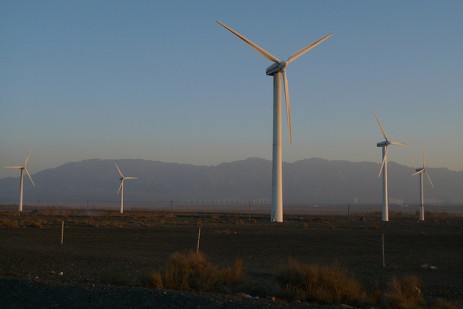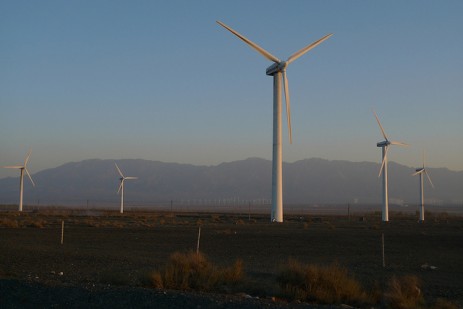 The United Steelworkers are mad as hell that the Chinese government helps clean energy companies cut costs.Photo courtesy jlau via FlickrIt’s no secret China’s been kicking our butt lately in the clean energy business. But the truth is China hasn’t exactly been playing fair, and now one of the biggest unions in the U.S. is screaming about it.
The United Steelworkers are mad as hell that the Chinese government helps clean energy companies cut costs.Photo courtesy jlau via FlickrIt’s no secret China’s been kicking our butt lately in the clean energy business. But the truth is China hasn’t exactly been playing fair, and now one of the biggest unions in the U.S. is screaming about it.
Advantage, China: For starters, a trade war over renewable energy products like solar panels and wind turbines may not be such a bad thing; at least they’re now considered worth having a war over. That said, the United Steelworkers made it clear yesterday that they’re mad as hell and America shouldn’t take it anymore. The problem, they say, is that the Chinese government helps clean energy companies cut their costs and that allows them to sell their products overseas at a lower price than anyone else. You know the rest of the story … U.S. companies can’t compete, they shut down, Americans lose jobs. The union says the Chinese are breaking all kinds of international rules on exports and they’ve petitioned President Obama to pressure Chinese leaders to clean up their act.
Clean breaks: Earlier this week, Keith Bradsher detailed China’s sketchy policies in The New York Times, laying out that government’s track record in helping clean energy companies get cheap land or low interest loans or other subsidies. Multinational companies have shied away from formally challenging the practice because they’re afraid they’ll be shut out of the alluring Chinese market. Writes Bradsher:
The booming Chinese clean energy sector, now more than a million jobs strong, is quickly coming to dominate the production of technologies essential to slowing global warming and other forms of air pollution. … much of China’s clean energy success lies in aggressive government policies that help this crucial export industry in ways most other governments do not.
So bad is good? Bradford Plumer, of the New Republic, makes the case that the U.S. hasn’t really done much to help its own cause in the renewable energy competition. No climate or energy legislation, no national Renewable Electricity Standard, and an Energy Department painfully slow in distributing monies already committed to clean energy.
Andrew Leonard, in Salon, points out that, like ’em or not, China’s policies have actually been a boon to the renewable energy business:
The great irony of all this is that the world stands to benefit greatly from China’s renewable energy push, regardless of whether it is achieved by fair means or foul. Economies of scale applied to the production of solar panels and wind turbines in China are already pushing prices for renewable energy power down worldwide, making it more and more feasible to replace fossil-fuel power sources with clean tech. Even more encouragingly, the creation of a vast infrastructure for renewable energy research and development is bound to lead to countless downstream technological innovations that lower prices and expand capabilities even further.
And Michael Levi, writing for the Council of Foreign Relations, agrees, adding that China’s edge in clean energy jobs comes in the least profitable areas of the business:
U.S. firms are unable to hold on to cell and module manufacturing (“the final manufacturing steps”) but still have an edge in wafers and silicon, where there is far more profit to be made. Indeed by lowering the cost of turning wafers into finished solar products, (Chinese) companies likely help grow the market for the things that American companies make.
Cars in their eyes: China’s dream of dominating the world’s clean energy business includes making a big splash with electric cars. As Damien Ma writes in The Atlantic:
EVs (electric vehicles) are all the rage these days in China, at least among industry and policy wonks in Beijing. The logic is simple: Having missed the industrial revolution, and then assumed the role of a benchwarmer during the information revolution, China must now seize on the energy revolution. Beijing wants game-changers, and it has pinned hopes on EVs as one of them.
Evil scientists: Meanwhile, here in the U.S., speakers at an Ohio “Rally for Jobs” mocked global warming as a “hoax” and ranted that “so-called green jobs” were “phony.” Scott Keyes, of Think Progress, has more on the event organized by the American Petroleum Institute and funded by right-wing billionaires and infamous climate change deniers Charles and David Koch. These kinds of spectacles have moved the journal Nature to wonder where the right wing’s anti-science crusade is leading us. Its recent editorial begins with a signature Rush Limbaugh quote:
The four corners of deceit: government, academia, science and media. Those institutions are now corrupt and exist by virtue of deceit. That’s how they promulgate themselves; it is how they prosper.
Bermed again: Speaking of Republicans dissing science, remember when Louisiana Gov. Bobby Jindal ignored the warnings of coastal scientists that the sand berms he wanted to have built along his state’s coast and marshland would do more harm than good? Only four miles of berms have been built, but the EPA is asking the Army Corps of Engineers not to build any more. The feds say the barriers have done little to stop oil from washing ashore, but do pose a threat to wildlife. Jindal’s plan is to spend $360 million from BP to create about 100 miles of berms.
The spice is right: One of the myths in the war against methane is that cow farts are the great enemy. Not so. It’s cow burps we must fear. Cows account for about 37 percent of the world’s methane emissions and most of that comes from belching. But help may be on the way. Jeanna Bryner, at LiveScience reports that after testing all kinds of plants and oils, Penn State researchers found that an oregano supplement reduced the gas their cows were putting out by 40 percent.
It did not, however, appear to make them any smarter.



